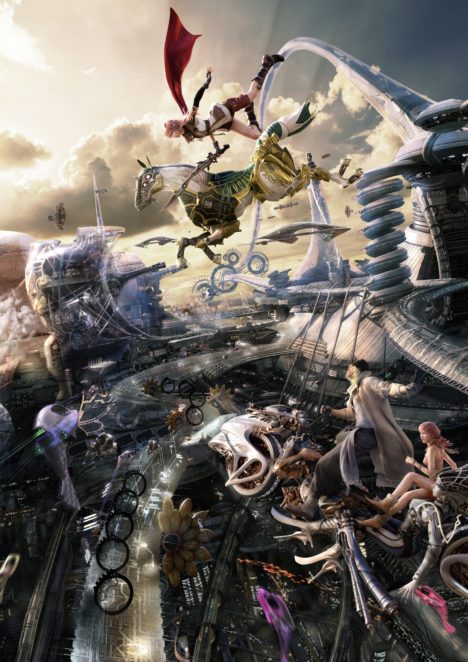An editorial opining that the JRPG is now a dead genre, and offering 5 reasons why this is the case, has recently been circulating, both in Japan and internationally, and is particularly topical in light of the ongoing controversy ensuing from Bioware’s stinging comments on the matter.
The writer puts it thus:
1. Dumb Stories and Mediocre Storytelling.
Every JRPG has the same basic storyline: Someone or some small group of people (Shinra, Gongora, the Vendeen Empire) is using a supernatural relic or substance to control a godlike force.
Some poor misbegotten orphan or miscreant or misfit teams up with an unlikely gang of hooligans to take on the evil person or group, unwittingly finding themselves in the center of a centuries-old prophecy along the way.
These stories (or rather, the slightly different versions of this same story) are always told with vague, wandering dialogue that includes gripping lines like “…”. The player must endure many different kinds of cutscenes, which sometimes drag on for half an hour.
2. Needlessly Complicated Game Mechanics.
Unlike DW’s majestic simplicity, modern JRPGs are packed with asinine “features” like weapon-combining, materia management, ring sorting, and crystal junctioning.
Each game requires the player to keep track of some new stupid (and counter-intuitive) system of tracking each character’s progress and development.
It’s bookkeeping masquerading a “something new”, because every game must include “something new”, lest the critics and/or audience realize that they’re watching the same dumb story and characters.
3. Repetitious Boss Fights and Convoluted Patterns for Defeat.
The aforementioned game mechanics aren’t just window dressing; the player must master the crystal-junctioning system if s/he wants to defeat the final bosses.
If you don’t use precisely the right ring at precisely the right time with precisely the right weapon and precisely the right magic spell, you will get stomped and smashed like Hyde United in the 1887 FA Cup.
Fortunately in the age of the internet, we can learn about this precise combination with ease, but we shouldn’t have to! In the old days, players could develop their characters into powerful mages and warriors, using whatever combination worked for them. (Okay, you had to use holy water to take down the vampire boss, but it all made sense.)
And JRPGs today make us fight the same boss over and over and over. Boring!
4. Real-Time Combat is the Only Combat.
I know I’m in the minority here, but I miss turn-based combat (TBC). As we’ve said on the podcast, TBC was likely necessitated by the limitations of earlier systems, and once developers could add the same complexity to real-time combat, they did. But TBC provides something unique for an RPG.
The player can plan out each move, take some time to switch weapons or line up spells, and manage the party. Especially when we’re in charge of multiple characters, real-time combat is a real grind. (BioWare has done some good work finding middle ground, with Baldur’s Gate and Dragon Age: Origins, but I still prefer TBC.)
Alas, most JRPGs are sliding toward the RTC-only pattern, and dinosaurs like me have few options for our preferred style.
5. Some Things Just Don’t Belong.
Chocobos are silly, and they really don’t fit into an epic struggle between good and evil. Why would anyone make a gun-sword? What is up with those stupid hats in Lost Odyssey? Why am I hunting for paper to feed a goat?
Apparently sometimes a dumb idea will get tossed out in the writers’ room, and they’ll all have a good laugh, and then it will get included in the game, presented with a straight face. Stick to the core elements, people!
The excessive conservatism afflicting modern game design, an understandable consequence of the level of financial risk involved in modern HD titles which may cost millions to make, has resulted in endless rehashes and a severe affliction of “sequelitis.”
Whilst this problem is fairly severe amongst western developers, amongst Japanese developers it seems to have resulted in total petrification, all the more so in the RPG genre, which appears to be eroding sales even amongst Japanese gamers.







I am really delighted to read this weblog posts which carries tons of valuable data, thanks for providing these information. link building tools http://linkbuilding1.overblog.com/
Whoever made that list is an idiot. They can’t figure out easy ass Final Fantasy game mechanics? REALLY? And I still like most JRPG stories. Seriously whoever made that list is a retard who can’t figure out basic controls. They should go back to playing Tetris or Pong or something.
I agree with 1 through 4 but disagree with [b]5[/b], especially once I read the description under it…
1-4 should be easily avoidable most of the time & yet I still enjoy them…that being said, I don’t really care about the story though so…
Writer must be americannn
precisely why I missed the Suikoden series (except 4). for it’s storyline, simplicity and it being turn-based. hear it konami? revive the franchise!
I just don’t agree on the chocobo part, works for me.
To each his own I guess. Maybe I’m one of the old dinosaurs lol.